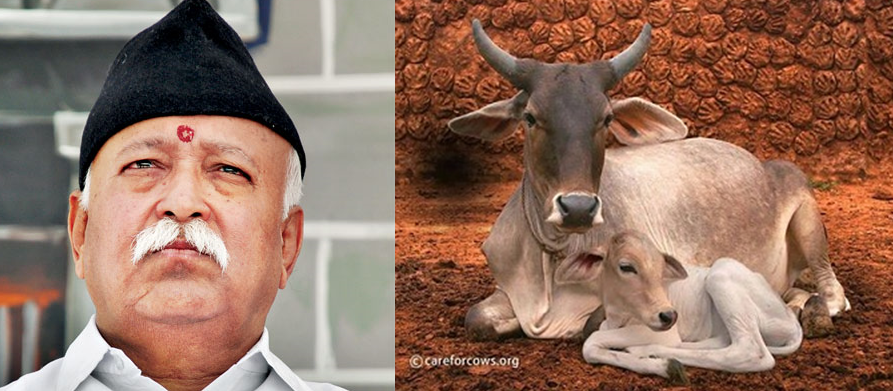A brief glance at the list of splurges unleashed by the self styled Gau Rakshaks across the country can make us sit wondering whether there exists any bigger irony in this world than these abominations going about identifying themselves as ‘Rakshaks’.
Notwithstanding the PM’s condemnation in August and the RSS Chief’s call on Vijayadashami Day to condemn the self-appointed Gau Rakshaks, it is of utmost importance for all of us- who are striving for progress despite umpteen numbers of social perils that pull us back- to understand that these vigilantes (if at all they deserve to be called so) are by no means to be clubbed along with the usual criminals who are mere violators of the law and order.
The threat that self styled Gau Rakshaks pose is more than routine crimes.
Their deplorable activities come with deep and far reaching socio-political consequences. Indian society, if the happenings of past are to be seen as a pointer, is one that can get quickly mobilized along any kind of sectarian line.
Most of the times, the collective aspirations are articulated with the help of symbols that are revered by the respective communities. More often than not, history has seen Hindus organizing themselves in the name of cow.
There is no better example than our First War of Independence against the Britons in 1857, when Indian sepoys shook the very foundations of the East India Company. Trigger? Cow fat used in the grease for the Enfield P-53 rifles! This level of sensitivity can easily be fall prey to being misused, whether deliberately or otherwise.
As such, considering the sensitivity towards cows in India, is it not important that we must be vigilant about the purpose and methods of the vigilantes of our times? And, by vigilant, I do not intend to propose the Adarsh Liberal line towed by the likes of Shobhaa De where you go about lambasting on twitter: “I just ate beef. Come and kill me”!
This kind of alarmist attitude can only do more harm than good. The approach should be more about separating the “wheat from the chaff”. For that, we must be aware that Gau Rakshaks tend to operate within the realm of law, more or less.
In addition to the many restrictions imposed by different States, the Directive Principles of State Policy [DPSP], although not legally enforceable, endorses the protection of cow. As such, prohibition of cow slaughter is a Directive Principle of State Policy contained in Article 48 of the Constitution, the Constitution designed at the behest of none other than Dr. B.R. Ambedkar.
By bringing in Babasaheb’s name, the intention is not so much as to construe that Babasaheb stood for Gau Raksha or not but to point out that the designers of our law and order were aware and wary of the economic and cultural significance of cow in India.
In the light of this, the comprehensive approach towards cow protection must be one that considers the guidelines of DPSP only as far as it puts a check on the uneconomic usage policies of cattle and discourages outright violation of cultural taboos while at the same time addressing the issues of Fundamental Rights violation that can arise from such a constraint from DPSP.
What the cow vigilantes must hold in mind is the fact that under no context can the DPSP prevail over the fundamental rights of India’s citizens. To put it short and crisp: Gau Raksha – only as far as it contributes towards Maanav Raksha.
India’s cattle population, the largest in the world, sustains our populace not only through provision of milk, meat and hide, but also through labour; by means of ploughing the fields for our largely non-mechanized agricultural sector.
Now let me address the reader’s anxiety on why there is a need to delve into the central role of cow among India’s population in order to describe the menace that Gau Rakshaks have come to be.
There is a need: a need necessitated by the millions of sincere Hindus who revere cow, and the billions who had already left their mark on this land. Regardless of the left liberal onslaught against cow protection and the persistent efforts to demonize the imagery of cow in our minds, we cannot turn our backs at the way cow has influenced our language and culture.
The very English term ‘cow’, having been derived from the Sanskrit term Gau, in itself speaks volumes about the historic connection India and the bovine animal has. Therefore, repudiating the embarrassing Gau Rakshaks in a more nuanced manner- especially by those who are proud of India and its legacy and not overnight liberals- can convey the message loud and clear to the Gau Raksha Dals that their acts the straight opposite to what they think they are doing – upholding India’s culture.
When the Gau Rakshaks go about lynching people one after the other over their own perceived notions of law and order violations, it is not just the particular victim and his/her family that is affected, but also the collective moral psyche of Indians that becomes disturbed, embarrassed, and angered.
In this regard, the PM’s choice of words, although coming a little too late, that “I feel very angry at this Gau Raksha business” could not have been more precise.
